Belonging in the 21st Century: The Quest for Self-Esteem
Are you sad? Sense of belonging. Are you a bad person? Sense of belonging. Are you (fill in the blank)? Sense of belonging.
Sense of belonging has become the theory that solves every and any problem. But is that true? Or is it a modern belief?
If everyone says “You need a sense of belonging,” they must be, right?
Or are they?
In this essay, we will embark on a journey to explore the origins of belongingness, why we “need it,” and why we may not.
The Last Two Hundred Years
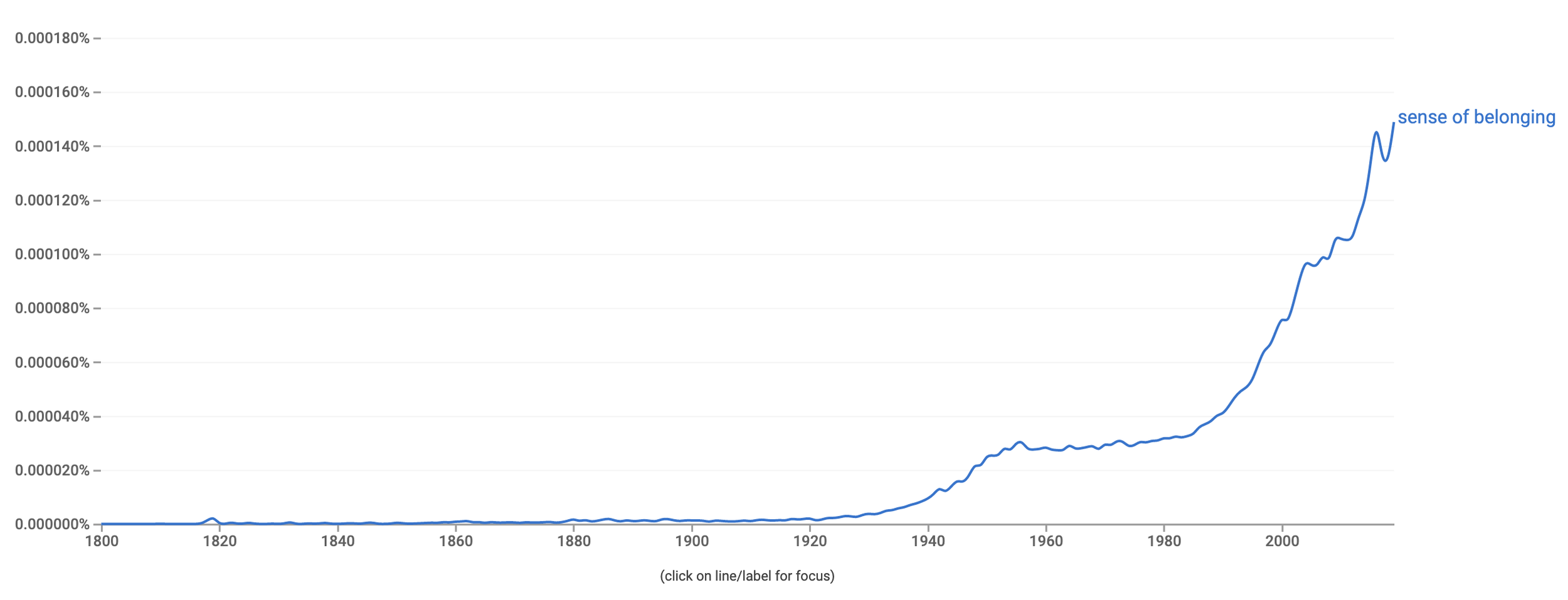
Sense of belonging has skyrocketed in the last century. Continues to show up more and more, especially after roughly 1985/1990.
If you compare this to popular terms like soccer or the stock market, “sense of belonging” is quite high.
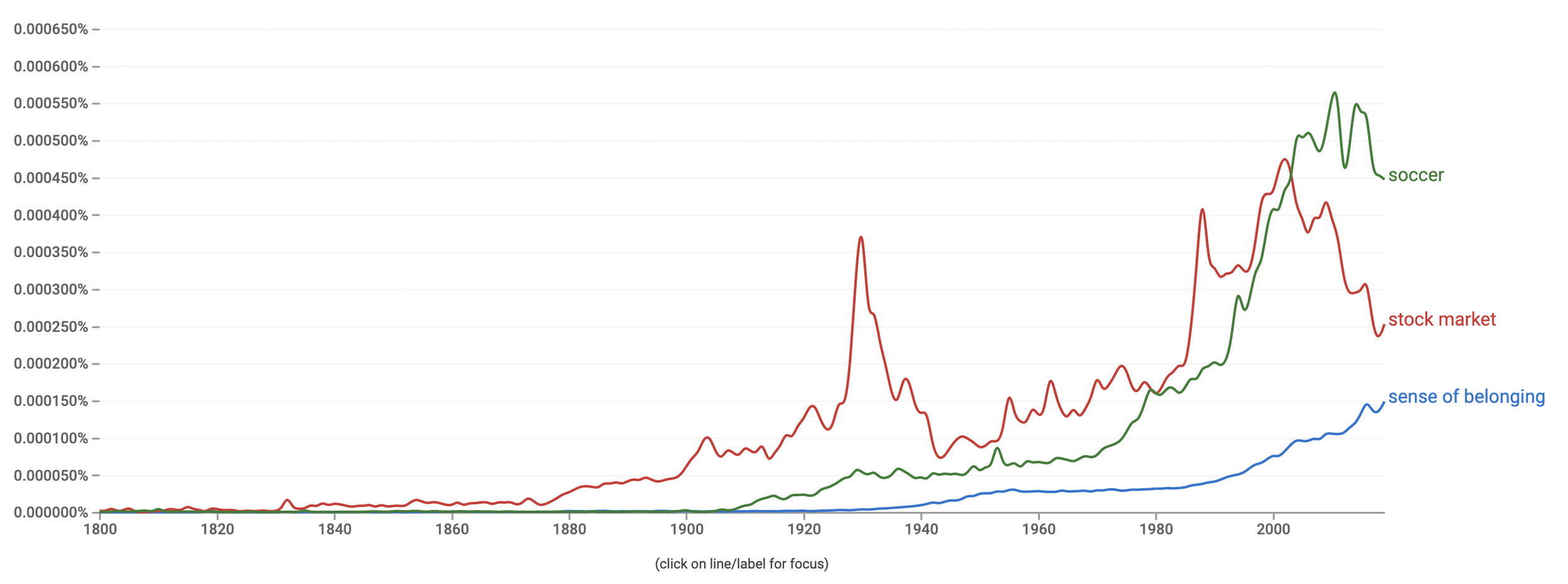
Get ready. Let’s figure out its origins and whether we’re thinking about it correctly. If you're ever going to think about something, always think about how to think what you're thinking.
Origins
I’ll be honest. I tried to research the origin of the idea of “belongingness,” and I could not find a convincing answer. I’ll tell you what I think, and the internet will do what it does best, tell me why I’m wrong (I’m serious, contact me if you think I’m wrong).
Throughout history, a sense of belonging was “essential.” Even all the way, in the 1800s, people believed it was crucial.
I've noticed that people blurt out the "sense of belonging" thing as in "sense of belonging fixes all problems." Are you a criminal? Sense of belonging. Are you unhappy? Sense of belonging. Are you (fill out in the blank)? Sense of belonging.
I’m not kidding. In the Investigation of So Called "Rackets," a 1933 series focused on how to stop and end the Mafia. Ernest Piper argued if you construct a greater sense of belonging than those in gangs, its members would be stopped.
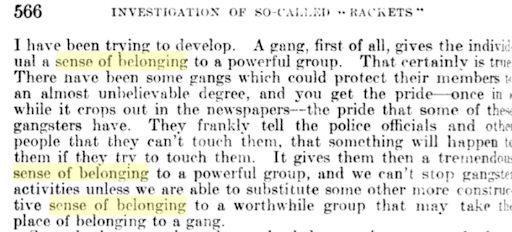
I would not disagree actually, and his argument seems convincing enough. Gangs give confused individuals the feeling of belonging to something greater than themselves. Gangs provide young people a sense of adventure and “risk” than nothing else, except perhaps a war provides [1].
I’m not here to prove him wrong. I’m here to figure out why he used or thought about “sense of belonging” in the first place.
For that, let’s figure out where the word belonging comes from.
It comes from the Old English belangian, which means to desire or to long for. To belong is to desire.
Why do humans have desires? Where do they come from?
I’m not entirely sure, but we can go back to what some think was the first human, Adam. You could argue Adam needed a sense of belonging. Although not in the Bible, one could argue that because he had no one to share his life with caused him great pain and sorrow. So much that he asked God to create him a companion.
But where did Adam get this desire to belong? You could say he was lonely. Once God had created animals and their companions, he realized he didn’t have his counterpart. Adam’s desire was mimetic, meaning he wanted what the other animals had and wanted the same for him.
Perhaps that’s the reason the 10th commandment is “You shall not covet,” meaning you should not want what others want or have.
Again, this is pure speculation, but it’s interesting to think about. See my notes below [2].
That’s one possible origin.
René Girard argues that desire comes from the desire of the other. When we see someone else desire something, it can cause us to want it too. Human desires can come from many places.
For fun, I asked an AI (GPT-3) about the origin of desires. This was the response:

Ok, thanks. Hopefully, humans figure out that question before AI does.
Let’s continue.
How about a more psychological and evolutionary view?
What Do Psychologists Think?
From the Belongingness Wikipedia page, “Belonging is a strong feeling that exists in human nature.” Or, “Belongingness is the human emotional need to be an accepted member of a group. “
Do you see how assertive words like “exists” or “emotional need” are? They leave little room for doubt.
What if, only if, belongingness wasn’t as important as we think, or isn’t an emotional need?
Huh? Interesting. When people are so sure is often when people are so wrong.
Let’s start with Abraham. Yes, Abraham Maslow, the guy who created the hierarchy of needs, which everyone has freaking learned about. You may know him because of the pyramid.
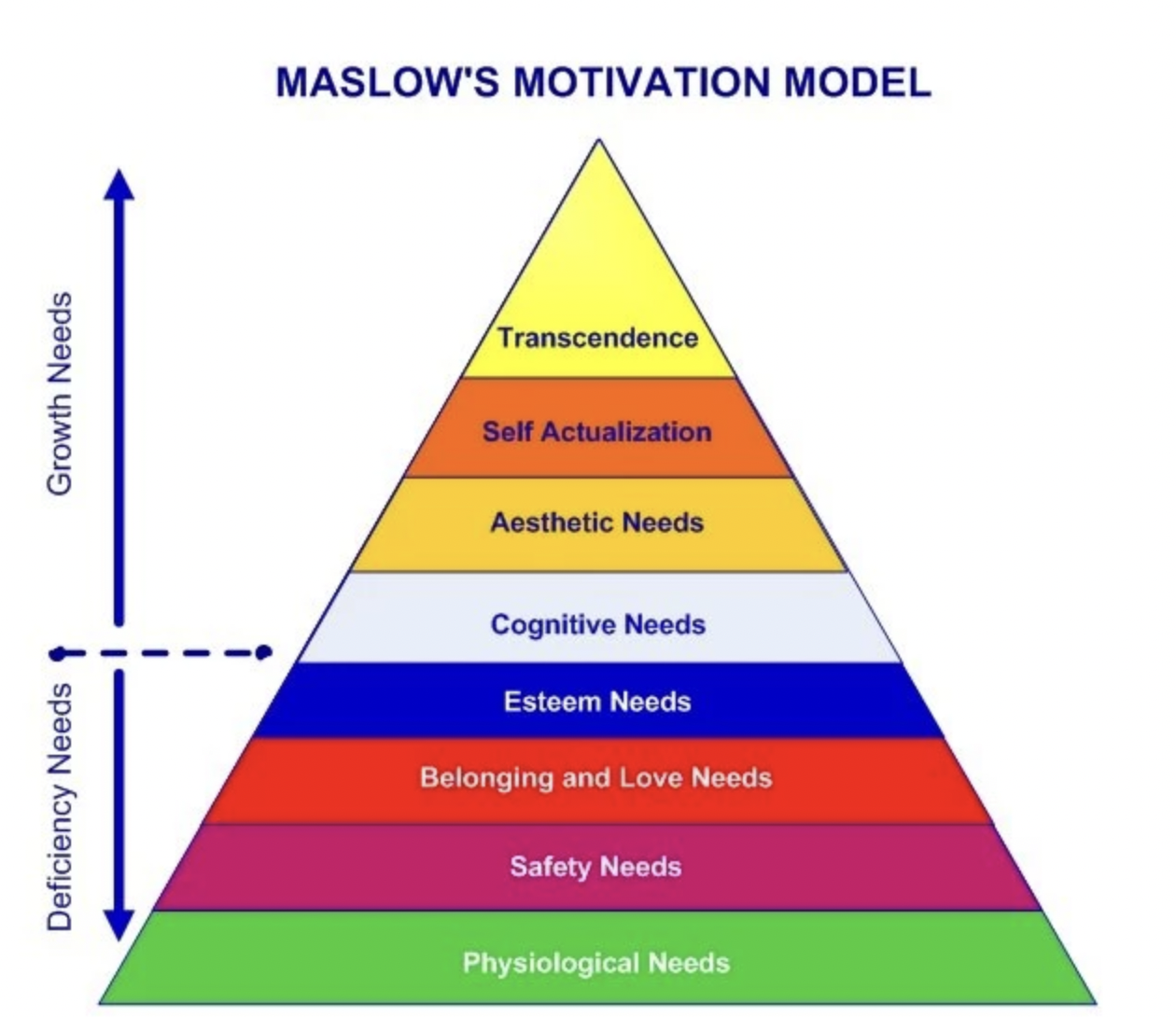
Why don’t ask Abraham why he thinks a sense of belonging is a “Deficiency Need”? Well, I can’t ask him because he closed his eyes a while ago.
The model says deficiency needs are after the physiological ones such as having enough water, food, and sleep. Then, safety needs, including good health, or a stable job.
Now, we get the Belonging and Love Needs, which according to Abraham, it’s crucial for humans to be part of a group.
Understood? I know. You probably learned this in elementary school, but I needed to make sure.
Ok, I read the Wikipedia page, and frankly, it doesn’t smell good. Let’s go to the primary source, yes the 1943 paper, where he writes and publishes what he calls, “A Theory of Human Motivation.”
And before we start on that, I need to tell you a little spoiler. I MUST!
Remember this boring-ass pyramid?
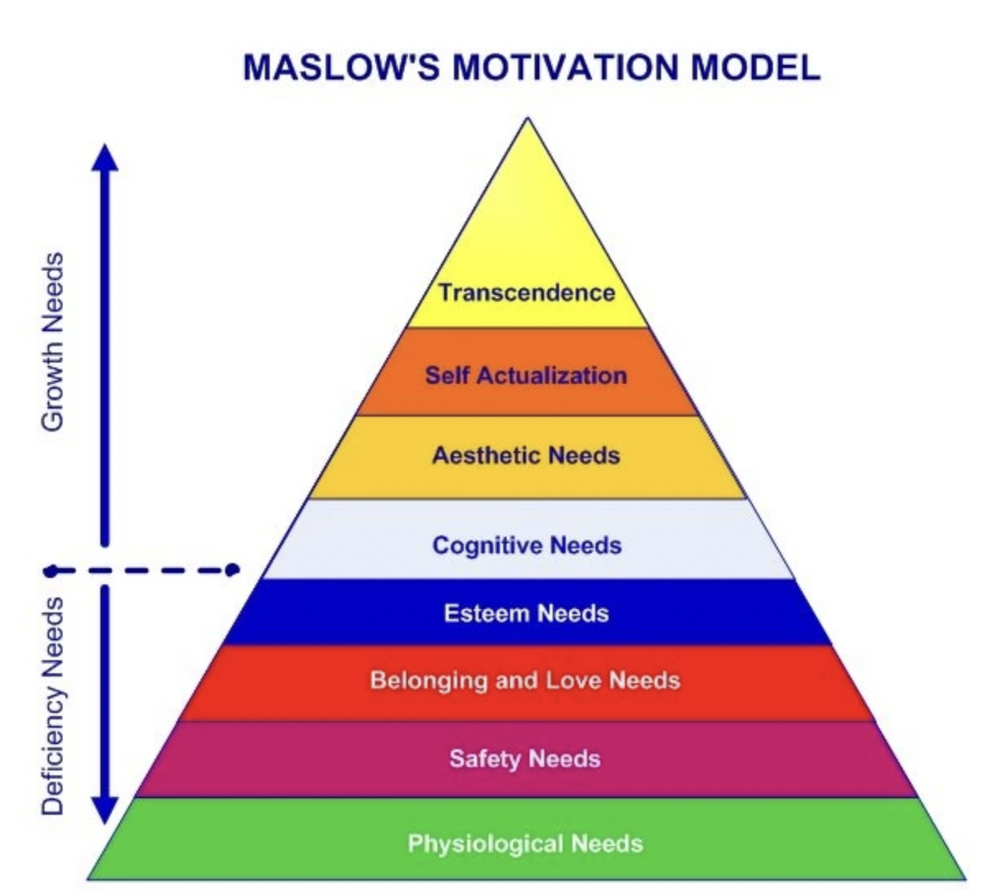
Our friend, Abraham, did not create it. “All models are wrong but some models are useful.” And this model is even more suspicious than useful.
First, he did not create it. Second, it’s neither accurate nor complete.
If Abraham didn’t create it. Who the hell did? A consulting psychologist, Charles McDermid, published a 1960 essay where he included the pyramid we know today.
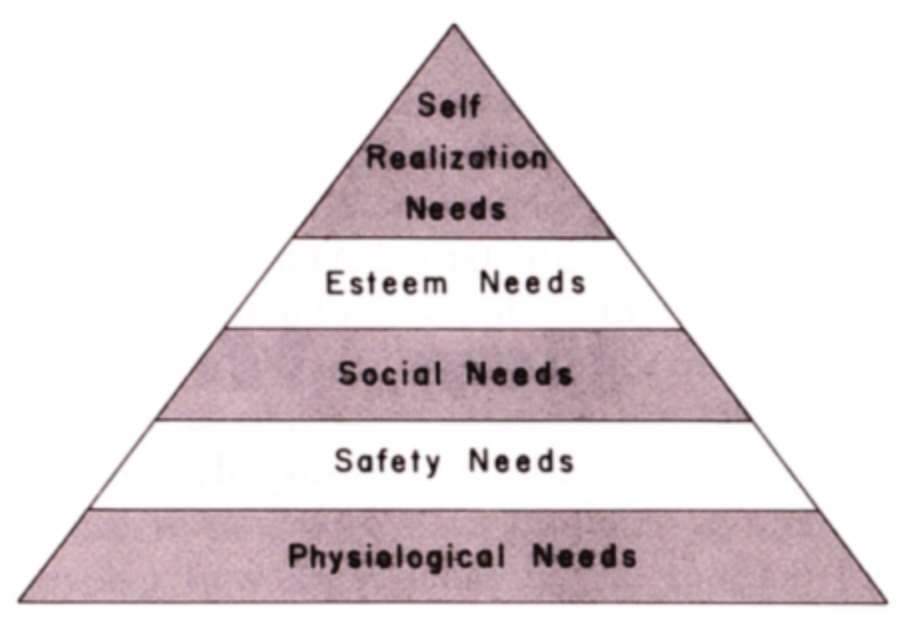
Very cool. If this sounds interesting, there’s a whole investigation of where the pyramid came from. Summary, here.
The pyramid’s main issue is its video game’s nature, where you work hard to level up and move across levels. But this isn’t accurate. The authors of the investigation recommend a ladder. Our hands and legs are on different rungs, which explains the interconnectivity of different needs.
Ok, why did I take you to this rabbit hole about the true origin of the pyramid?
Well, I found that interesting and curious. But the other reason is to refute what the pyramid portrays. According to the pyramid, if you don’t have a sense of belonging, you cannot move up. But as we learned, this concept was not meant to be a pyramid, which conveys that a sense of belonging isn’t as crucial as we originally thought.
Let’s continue.
Our friend Abraham isn’t the one to blame. Quite on the contrary [3]. He tried to revisit this model to include what he called “peak experiences,” which are experiences that throw his model off. This means when someone has a mission to start the civil rights movement or start a colony on Mars. These people do not fit into his model because the level of drive and ambition overtake what we previously thought was a “need.” Needs are very context-dependent.
Towards the end of his life, Abraham Maslow thought there needed to be another need called “self-transcendence.” This is when individuals rise above personal concerns and acquire a higher purpose through intense feelings of joy, love, understanding, and ecstasy.
All done with our friend, Abraham. Thanks, bud.
What about other psychologists? Mainly, they think it’s a need, not a want. Some argue that if you fail to have a sense of belonging, you’ll suffer from loneliness and mental disorder [4].
There’s even a belonging hypothesis, which proposes two main features composed of people needing constant personal interactions and the assurance of mutual concern. This means the need to belong isn’t a need to and/for connections but rather having the perception that others care about you. This idea of the sense of belonging depends on the perception that other people care about you.
This isn’t necessarily bad but the issue is the dependence on the other. Wanting or needing to belong becomes problematic when your self-worth and identity come from the sense of belonging. We’ll talk more about this in a bit.
Conclusion about what psychologists think? They think it’s a need. Not just any need. A fundamental need. They think that a sense of belonging is as important as water or food to live.
The next obvious step in this journey is the evolutionary perspective.
Evolution?
Let’s imagine this scenario. You and I are in the middle of the Amazon Rainforest. It’s humid, there’s wildlife… and you get it.
I am… me, and you are…you. Why would I need you? You could say that I not only need you but more like we need each other. What’s my assumption? What if one of us gets injured and can't hunt for food anymore? If it weren’t because of you, I would starve and die. Or what if a humongous Boa bites you and leaves you in the same position? This looks like an interdependent relationship based on the assumption of the worst.
But for the sake of the argument. What if we flip our assumption?
Instead of being an interdependent relationship. It becomes nice to have, but not necessarily crucial to survival. If you and I get together, we’ll be able to spend time together, share stories, and wait for entropy to get rid of us. But also for other things like reproducing, specialization to get certain foods as I focus on hunting, and you focus on vegetables. It’s not just nice to have, and it ends up being as important for our survival.
You can probably still survive, but it would just be a lot harder.
If you and I are living together, you are invested. You want me to succeed. I want you to succeed. Otherwise, this means we’ll be hungry tonight.
Recently, the world grew and we no longer have tribes the way we used to. We do have groups that cheaply resemble such tribes. Ever heard of a college fraternity? Sports team fans? WhatsApp group? Or most recently, a DAO?
They all mimic having a group and the so-called “sense of belonging.” But why is this?
Belonging: Seek Self-Esteem Through Others
Anywhere you go, or anyone you ask will tell you the same shit: You need a sense of belonging. A sense of belonging is important and blah blah.
But I don’t think it’s true. Maybe for people like me, it isn't as important. But again, why is this? I’ll try to explain my intuition.
From my experience, I've seen two types of people:
-
Those who want and need to belong, and
-
those who simply don't care, meaning they don’t give it as much importance.
The first group of people tends to suffer a lot when they feel like they don't belong. There seems to be a reason that makes certain people fall into these groups.
During quarantine, many people felt depressed and lonely while others thrived with the extra time to create projects. I was part of the latter.
As we previously learned, you can probably make a semi-strong argument that a sense of belonging is part of being human.
So let’s suppose a sense of belonging is, indeed, part of being a human. If that’s true, then it would be a question of how strongly we feel the sense of belonging.
Everyone in some way or the other wants to belong but to some, it’s not a life or death issue. It’s just not important.
Sense of belonging is a facade. A facade to face life head-on. A facade to fully living.
So what are we hiding behind this facade?
Self-esteem.
Self-esteem seems more like a need than belongingness. Self-esteem is deep, obscure, and you cannot escape it. You need to think that you’re good. That you’re capable.
That’s where the sense of belonging comes in and replaces self-esteem. Belongingness takes place where people around you reassure you that you’re good and that you’re capable. And yes, this is how most people live their lives. They use belongingness as a way to fulfill the self-esteem need. It’s a lot easier when others tell you that you are good than yourself believing and earning such merit.
This is why the idea of a sense of belonging is dangerous. It’s ok if you need or want to belong. Who cares? It’s the idea behind belonging: self-worth, self-respect, or self-esteem coming from belonging. This is subtle and rewrites how we think about relationships.
“You are your hardest critic.” It’s true and for a good reason. We only know if we did the work when no one was looking. We only know if we actually enjoy what we’re doing. We only know if we are truly happy.
But many take a different route. The best way to explain it would be with this quote by Mr. Charles Cooley. He said, “I am not who you think I am; I am not who I think I am; I am who I think you think I am.”
If I am what I think you think I am, I have to guess but also act in a way that fulfills your thoughts of me. This is where a quest for belonging starts for many people. Such quest is driven by insecurity about your self-worth. A quest for self-esteem is the proof of its lack.
Sorry but sense of belonging ain’t savin’ you.
What if I answered that question myself? I won’t have to ask you, nor guess what you think of me. This is a more independent view of yourself as an actor in the world. Don’t get confused with our modern emphasis on a sense of “belonging.” The source of self-esteem comes with developing a sense of capability. You need to be capable of knowing, acting, and loving.
Once you get that straight, a sense of belonging takes on a different meaning. Instead of being driven by insecurity and fear, it will be driven by curiosity, community, and exchanging value with others.
In the journey we embarked on earlier, everyone said a sense of belonging is a feature of human nature. But to me, it’s more like a feature of our age [5]. Honestly, more like a bug.
Did it have to do with childhood or upbringing? A lot.
If children are not given the opportunity to feel capable through their work. Kids won’t develop self-esteem. This becomes important when choosing how to live your life, who to share it with, and what to do with it.
Work gives you dignity. The majority, if not all, of self-esteem, comes from doing chosen work. The sense of capability develops once you are free to create and choose your work. You develop your self with intention and purpose about your goal-directed work.
And listen, self-esteem won’t ever fucking come from your parents loving you, or good role models, or money, or whether your “friends” like you. Don’t get me wrong, such things are good but they won’t ever create self-esteem or self-respect.
What typically happens is that adults interfere with the process by helping or reassuring too much. This leaves people confused and lost. Everywhere around us, people are looking for purpose. All they say they want is purpose or passion.
But the purpose is to find what gets you excited through the use of our beautiful Earth, and soon universe.
When children are not given these opportunities to choose the work they want and how they want it, it causes them to be looking for “purpose.”
When in reality, the purpose has been the same since the beginning of time: take care of the earth and use what it offers to make what we want. Creation is life. The medium of all? Your work [6].
Let me give you a silly example. How many of your parents helped with your homework? How many of you, parents, help kids with their homework?
The answer for many of you will be an overwhelming yes. Want to know how many times my mom helped me with my homework? ZERO.
First, she was too busy, meaning she wasn’t going to stop working to help me do my homework. Secondly, after all, it was MY HOMEWORK to help me learn.
My mom never asked whether I did my homework, studied for tests, or brought lunch to school. She would tell me, “If you don’t want to do it, don’t do it. It’s your life, it’s your education.”
Parents doing homework is the start of a dependent life. Dependent on the validation of others.
If your parents did your homework, you are not a good student. But since the teacher does not know and thinks you did it, your self-worth is dependent on your teacher’s validation or perspective.
What is your real self-worth? Nothing. You lack it because you gave it up the minute your parents did the work for you. This isn’t only parents but friends, internet homework solvers, etc.
I remember from fourth to sixth grade, we needed to do a lot of projects, presentations, and project mockups.
It was for the kids but the parents did or paid someone else to do a bizarre project that everyone knew someone else made for them. Everyone knew what everyone knew but everyone chose to ignore it.
Of course, my projects were “shitty” compared to the other kids. I never got great grades because I had done my own thing instead of making people think I had done something I had not.
That right there is an example of where sense of belonging may be coming from as well as what sense of belonging rewrites: lack of self.
Letting someone else do the work for you changes your brain and your aim in life. You could say you want to be great, famous, respected, or admired. But all those things never come from you nor your will.
Sense of belonging is the same. It’s the perception that others care about you. You’re sad but the perception of others makes you think you’re happy. You’re a bad person but the perception of others makes you think you’re a good person. You’re (x) but the perception of others makes you think you’re a (y).
You know you didn’t do your homework but others like your teacher think you did it. Therefore, you think you deserve the grade or the respect but in reality, that’s where you’re getting your self-esteem from. Not from you, not from your work, not from your actions but from the perception of someone else.
Sense of belonging provides that stage for you because it’s hard to fake yourself, stand on your feet, and own your life.
Belonging is a way to seek self-esteem through others. But if you don’t respect or esteem yourself, how will you ever respect or love others?
This is the odyssey of our times: a quest for self-esteem.
...
Notes
[1] I’d suggest reading his whole hearing. It’s a great lecture on what changes individuals’ behavior within a collective society.
[2] I recognize this is big speculation because nowhere in the Bible said Adam was sad or needed a companion. We don’t know if Adam felt those feelings. Did Adam have the ability to desire?
From the Book of Genesis, it seemed like it was God’s decision alone. “The Lord God said, “It is not good for the man to be alone. I will make a helper suitable for him.”
[3] Maslow was open-minded and on The Hierarchy of Needs, he included exceptions to his model.
[4] Baumeister, R. F.; Leary, M. R. (1995). "The need to belong: Desire for interpersonal attachments as a fundamental human motivation". Psychological Bulletin.
[5] Sense of belonging as a human nature fact seems to be a modern phenomenon. Ray Girn pointed out to me that Ralph Waldo Emerson’s Self Reliance is an example of the opposite.
[6] This doesn’t mean you should work 24/7. This means you need to find what gets you excited. How will you uniquely contribute?
Well, that’s what I think. That is at least the answer I’ve found. This might be a question to live with rather than answered. A question to reflect upon rather than crude evidence.
Let me know where, how, and why I’m wrong.
Where am I being ignorant? Or a reductionist? What pieces of evidence am I missing?
Want to hear about any updates or corrections on this essay? I’ll keep you posted.